Ep. 40: Live recorded at Harvard’s Let’s Talk About Food festival – we host a discussion about “Ocean Farming” with CEO of Ocean Approved Bri Warner, and Perry Raso, founder of Matunuck Oyster farm & bar ||
Our seas are under threat. Floating plastic islands are but icing on the cake of a much bigger problem – how we manage the oceans. It’s a complex discussion with a simple solution. You see, we’ve got 92% of global fisheries already stressed, and large population densities are tied to some of these soon to reach exhaustion. The continued contamination from the waste we spew into these channels of our food, and all the supporting natural systems of the oceans will soon reach a ceiling. And, it’s going to hurt. With 3 billion reliant on sea-proteins as their main caloric intake for the day, if we have only dirty or no fish we’re all due for a rude awaking no matter where you call home. We’ve begun farming fish in all reaches of the planet. In fact, today 50% of fish consumed is farmed raised. But, most of that farm raised stuff is nearer feedlot beef as compared to the clean and healthy moniker that open caught seafood had long-since enjoyed. That it’s all changing is an understatement.
.
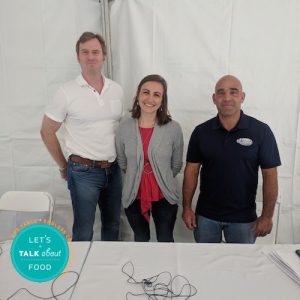 Sourcing Matters ep. 40: “Regenerative Ocean Farming”- live recorded at the “Let’s talk about Food” festival @ Harvard University – Host Aaron Niederhelman speaks with two dynamic New England leaders in shellfish and seagreen production to learn what it takes to farm our waters. Similar to a terrestrial grass-fed beef brethren – there’s been increased interest in regenerative ocean farming. Regenerative effectively means everything is renewed in the process of using it. It’s ecology down to trophic level, and up-throughout the interchange of vast systems which do include food animals, mollusks and ourselves. For those who do tend to the farmed fresh food from the ocean, alot of the hope for the future is being spawned in our clean cold waters of the Northeast. These local (ocean) farmers have developed models that give back to their natural environment to reap the benefit of a better crop. It just makes sense. By (i) addressing sea level rise and storm surge, (ii) alleviating hunger in impoverished areas, (iii) creating local jobs near highly populated areas, (iv) sourcing clean seafood as preventative human health care, (v) stabling natural environments in keystone areas (vi) motivated champions to fight for a cleaner environment – Regenerative Ocean Farming has vast potential for all coastal communities everywhere in the world.
Sourcing Matters ep. 40: “Regenerative Ocean Farming”- live recorded at the “Let’s talk about Food” festival @ Harvard University – Host Aaron Niederhelman speaks with two dynamic New England leaders in shellfish and seagreen production to learn what it takes to farm our waters. Similar to a terrestrial grass-fed beef brethren – there’s been increased interest in regenerative ocean farming. Regenerative effectively means everything is renewed in the process of using it. It’s ecology down to trophic level, and up-throughout the interchange of vast systems which do include food animals, mollusks and ourselves. For those who do tend to the farmed fresh food from the ocean, alot of the hope for the future is being spawned in our clean cold waters of the Northeast. These local (ocean) farmers have developed models that give back to their natural environment to reap the benefit of a better crop. It just makes sense. By (i) addressing sea level rise and storm surge, (ii) alleviating hunger in impoverished areas, (iii) creating local jobs near highly populated areas, (iv) sourcing clean seafood as preventative human health care, (v) stabling natural environments in keystone areas (vi) motivated champions to fight for a cleaner environment – Regenerative Ocean Farming has vast potential for all coastal communities everywhere in the world.
@OceanApproved
@MatunuckOyster
@Lets Talk About Food


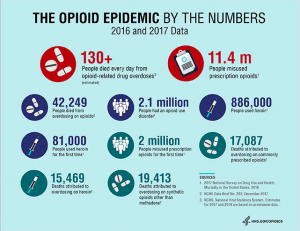
 Last, Scott Murphy serves as President of Veterans for Safe Access to Compassionate Care. An organization fighting for smart, just pain management programs for their brethren; for every community, and for every family as a proactive plan against this epidemic.
Last, Scott Murphy serves as President of Veterans for Safe Access to Compassionate Care. An organization fighting for smart, just pain management programs for their brethren; for every community, and for every family as a proactive plan against this epidemic.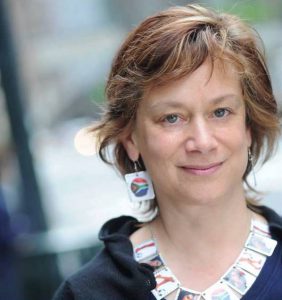 First, in “Cows Save the Planet” – she takes a look at restoring large scale ecological systems through holistic planned grazing of herbivores. Basically, by keeping animals on the parterre lands, in natural environments we evolve our management practice to actually harmonize with natural order. This kick starts natural environments that can have vast net positive impact on the climate. Soil everywhere becomes a thriving carbon bank – by first stabilizing natural exchanges, then sucking-up excess carbon we spew into the air. Judith shares her thoughts on the current state of affairs with this approach & mindset, and some new discoveries since publishing the book.
First, in “Cows Save the Planet” – she takes a look at restoring large scale ecological systems through holistic planned grazing of herbivores. Basically, by keeping animals on the parterre lands, in natural environments we evolve our management practice to actually harmonize with natural order. This kick starts natural environments that can have vast net positive impact on the climate. Soil everywhere becomes a thriving carbon bank – by first stabilizing natural exchanges, then sucking-up excess carbon we spew into the air. Judith shares her thoughts on the current state of affairs with this approach & mindset, and some new discoveries since publishing the book. Previous to beginning his work at the CLF in 2011, Martin was the Executive Director of the PEW Commission on Industrial Farm Animal Production. Martin managed a comprehensive two-year, $3.6 million study that led to the publication of eight technical reports and a final 122-page report on the public health, environmental, animal welfare and rural community impacts of our conventional methods for producing meat, dairy and eggs. The report – Putting Meat on the Table: Industrial Farm Animal Production in America defined a seminal moment of awareness in US production, food systems and supporting a shared one-health. It’s been a significant part of our realization that the approach we’re using to raise animals has broad reaching human and public health impact that needs immediate attention.
Previous to beginning his work at the CLF in 2011, Martin was the Executive Director of the PEW Commission on Industrial Farm Animal Production. Martin managed a comprehensive two-year, $3.6 million study that led to the publication of eight technical reports and a final 122-page report on the public health, environmental, animal welfare and rural community impacts of our conventional methods for producing meat, dairy and eggs. The report – Putting Meat on the Table: Industrial Farm Animal Production in America defined a seminal moment of awareness in US production, food systems and supporting a shared one-health. It’s been a significant part of our realization that the approach we’re using to raise animals has broad reaching human and public health impact that needs immediate attention. Throughout the 45 minute conversation Shauna shares some interesting anecdotes of situations that have arisen in her time at as VP at Annie’s, and most recently while managing the organic allotment of General Mills’ vast arsenal of products.
Throughout the 45 minute conversation Shauna shares some interesting anecdotes of situations that have arisen in her time at as VP at Annie’s, and most recently while managing the organic allotment of General Mills’ vast arsenal of products.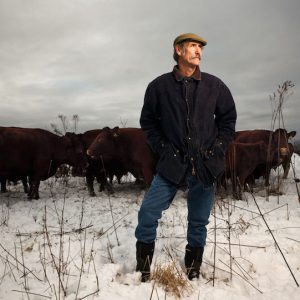
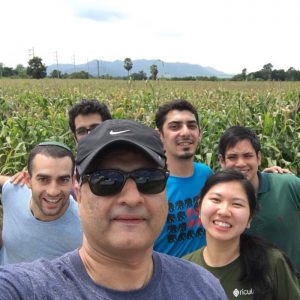 Their Bill and Melinda Gates foundation backed company has now architected and framed a system which alleviates many of the issues within current supply chains for small farmers. Supply chains for the billion small stakeholder farmers throughout the globe are often controlled by their investors, who maybe be better described as loan-sharks and present limited interest in feeding a shrinking planet nor looking out for the best interests of their debtors. From Clearinghouse -to- Financier -to- Marketplace preserving production qualities – it’s RIcult that has stepped in to re-introduce potential for small stakeholder farmers to make a fair living through growing our food.
Their Bill and Melinda Gates foundation backed company has now architected and framed a system which alleviates many of the issues within current supply chains for small farmers. Supply chains for the billion small stakeholder farmers throughout the globe are often controlled by their investors, who maybe be better described as loan-sharks and present limited interest in feeding a shrinking planet nor looking out for the best interests of their debtors. From Clearinghouse -to- Financier -to- Marketplace preserving production qualities – it’s RIcult that has stepped in to re-introduce potential for small stakeholder farmers to make a fair living through growing our food.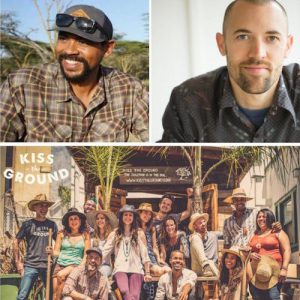 On episode 31 of Sourcing Matters we welcome Ryland Engelhart and Jesse Smith of Kiss The Ground. Well known for the critically acclaimed book and forthcoming movie, both sharing the same namesake as their organization, non-profit Kiss The Ground is telling a new story about our ability to regenerate land, reverse climate change and reconnect to nature by building back healthy soil. Through programs focused on storytelling, education, business, community gardens and the farmland – Kiss The Ground empowers people to restore soil and help accelerate the adoption of regenerative agriculture. Seamlessly complementing each other throughout the 45 minute conversation, both guests brought unique insight to our discussion which connected soil, human, and planetary health.
On episode 31 of Sourcing Matters we welcome Ryland Engelhart and Jesse Smith of Kiss The Ground. Well known for the critically acclaimed book and forthcoming movie, both sharing the same namesake as their organization, non-profit Kiss The Ground is telling a new story about our ability to regenerate land, reverse climate change and reconnect to nature by building back healthy soil. Through programs focused on storytelling, education, business, community gardens and the farmland – Kiss The Ground empowers people to restore soil and help accelerate the adoption of regenerative agriculture. Seamlessly complementing each other throughout the 45 minute conversation, both guests brought unique insight to our discussion which connected soil, human, and planetary health. It’s Agriculture Capitals mission to grow access to healthy, sustainable food. “We’ve assembled experienced professionals from finance, farming, processing, marketing, and sustainability to bring innovative thinking to managing successful food enterprises.” described the firm’s website. Turner has over 20 years of experience in corporate sustainability, environmental management, and consumer engagement. Most recently, he was on the executive team at organic yogurt pioneer Stonyfield Farm as the company’s VP Sustainability Innovation. Prior to that, he was founding executive director of Climate Counts, an international NGO focused on measuring and scoring the world’s largest consumer companies on their concrete, enterprise-level responses to climate change. Wood has consulted to brands, elected officials, and public agencies on mobilizing the public around ideas that improve the environment and build community.
It’s Agriculture Capitals mission to grow access to healthy, sustainable food. “We’ve assembled experienced professionals from finance, farming, processing, marketing, and sustainability to bring innovative thinking to managing successful food enterprises.” described the firm’s website. Turner has over 20 years of experience in corporate sustainability, environmental management, and consumer engagement. Most recently, he was on the executive team at organic yogurt pioneer Stonyfield Farm as the company’s VP Sustainability Innovation. Prior to that, he was founding executive director of Climate Counts, an international NGO focused on measuring and scoring the world’s largest consumer companies on their concrete, enterprise-level responses to climate change. Wood has consulted to brands, elected officials, and public agencies on mobilizing the public around ideas that improve the environment and build community.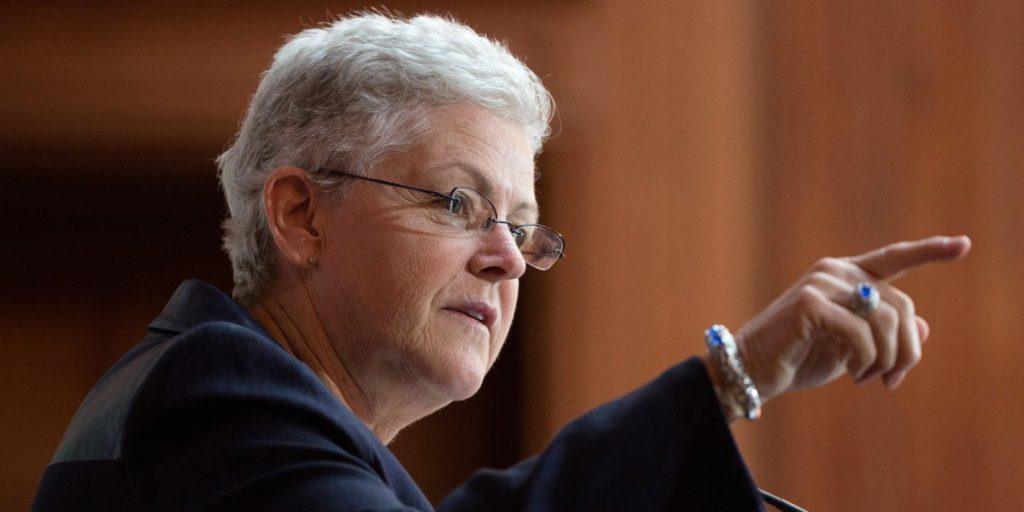
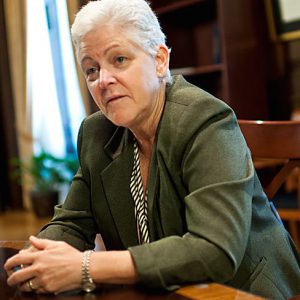 Gina explains that the EPA isn’t a birds & bunnies agency. But, instead one focused on public health and national security. “People need to realize, climate isn’t about polar bears, it’s about their kids.” McCarthy gets to the brass tacks of the movement, “The most important thing we can do is to realize the future is in our hands. We need to grab opportunities where they come, and be positive about it.” She continues “We need to put science to work, and explain it in terms that everyone can understand.” McCarthy recently completed a few fellowships at Harvard. “I found the students to be incredibly exciting and engaging. They had a sense of social justice and equity that was just palpable. They just didn’t want to tolerate moving forward in a world that doesn’t recognize that science is real, that climate change is happening, that manmade emissions are causing it; and that we have to do something – not least of which is to more women into office!”
Gina explains that the EPA isn’t a birds & bunnies agency. But, instead one focused on public health and national security. “People need to realize, climate isn’t about polar bears, it’s about their kids.” McCarthy gets to the brass tacks of the movement, “The most important thing we can do is to realize the future is in our hands. We need to grab opportunities where they come, and be positive about it.” She continues “We need to put science to work, and explain it in terms that everyone can understand.” McCarthy recently completed a few fellowships at Harvard. “I found the students to be incredibly exciting and engaging. They had a sense of social justice and equity that was just palpable. They just didn’t want to tolerate moving forward in a world that doesn’t recognize that science is real, that climate change is happening, that manmade emissions are causing it; and that we have to do something – not least of which is to more women into office!”